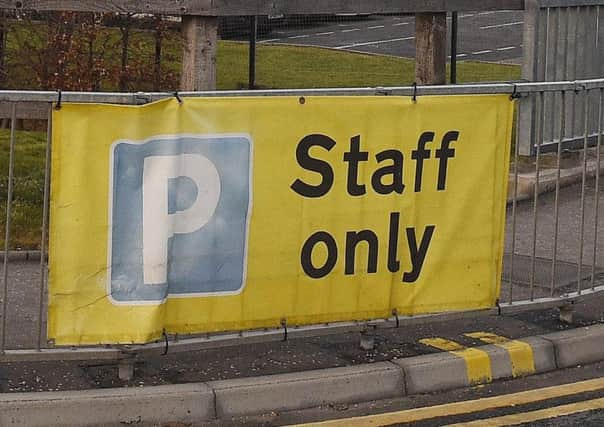Controversial workplace car parking tax set to become law


SNP and Scottish Green MSPs last night voted against a Labour amendment to the Transport Bill which would have seen the "car parking tax" scrapped.
Scottish Labour's Neil Bibby, who attempted to amend the Bill, said that the levy was "regressive" and accused the Scottish Government of failing to listen to businesses, trade unions and the people of Scotland, saying it would hit the lowest paid hardest.
Advertisement
Hide AdAdvertisement
Hide AdDuring one of the longest debates ever held in Holyrood, he said the levy was "not consequence free or fundamentally a solution to climate change, and penalises those for whom modal shift is not an option, because for many working people public transport in Scotland is simply not good enough."
He said it was "an outrageous tax on people simply turning up to work", and added: "This proposal is beyond mitigation. This is not a test of the Parliament's will to act on climate change. Nor is this a test on funding councils fairly. This is nothing more than a political fix to pass a budget, a fix that will hit low paid workers, and it's one we cannot support."
Mr Bibby said there were also no guarantees the levy would be used to invest in public transport as there had been no economic impact conducted by the Scottish Government, and pointed to objections by teacher and social worker bodies among others about a "threat" to recruitment.
Scottish Liberal Democrat, Mike Rumbles, said the levy was being introduced "contrary to evidence" from Nottingham, which is the only UK city to introduce it.
He said: "All the local authorities throughout England have had this power for a very long time, and have not moved forward with it. Why is Nottingham the only place? Because it invested massively in public transport.
"This is not about behavioural change. Nottingham hasn't reduced congestion and the clear advice to us on environmental reasons was not to impose Low Emission Zones and the Workplace Parking Levy at the same time. I'm surprised we're going with both of these against that advice."
Scottish Conservative MSP Murdo Fraser, also backed the scrapping of the levy, and said the tax had emerged from the budget deal between the SNP and Greens. He said: "It is simply a "bad idea which will hit lowest paid workers the hardest.
"It is regressive payable at a flat rate, and for those on low incomes it will represent a substantial hit to their pocket."
Advertisement
Hide AdAdvertisement
Hide AdHis colleagues attempted to pass exemptions for shift workers, teachers, emergency services staff, prison workers, residential adult care staff and those who did not have a bus or rail stop within half a mile of their home, and raised concerns about lone female workers being placed at risk. Labour's Colin Smyth also asked for low earners to be exempted, and for an earnings threshold to be set.
However, Scottish Green and SNP MSPs backed the levy and voted down the proposed exemptions.
Transport minister Michael Matheson said he was "somewhat disappointed" in the attempt to remove the levy. He pointed to Labour-controlled Nottingham council which was the first local authority in the UK to introduce a workplace parking levy, to Edinburgh Labour's council manifesto commitment to introduce such a levy in Scotland's capital, and to comments made by Scottish Labour's environmental spokesperson Claudia Beamish MSP, who has said she is "uncomfortable" with her party's position.
He said: "There are many in the Labour party who believe this is the right approach.
"If there's one thing that's consistent here, it's Labour's inconsistency on this issue. This is for local authorities to introduce such a scheme, it's a power not a duty. Local authorities would have the power to shape it to meet local needs.
"Labour says we must take bold, urgent action to tackle climate change, well let's see what they do about that today, or as ever will it be empty rhetoric with no commitment to deliver on it?"
After his amendments fell, Mr Bibby said: “The SNP's Workplace Parking Levy has been sold as a new revenue stream to fund struggling public services, but in reality it will hit public sector budgets for £5 million they simply don't have.
“When cash-strapped public bodies are handed the bill, it’s more than likely that – like other employers hit by the car park tax – they will pass it on to their workers.
Advertisement
Hide AdAdvertisement
Hide Ad"Councils need adequate funding - not a sticking plaster which will hit the poor and siphon funding from colleges and universities.
"Only Scottish Labour is fighting to end the cuts to councils."
However Green MSP John Finnie said: “The new powers over workplace parking levies will allow local government in our biggest cities to tackle congestion, air pollution and the climate emergency.
"Councils have been asking for these powers for years, and I’m delighted that Greens have been able to deliver this simple and effective change, which will raise much needed funds to improve local public transport services."
MSPs did agree to support amendments to the Bill which would see councils being able to run their own bus companies and a ban on pavement parking.
Mr Finnie added: “When the Transport Bill was first published it was lacking ambition. I’m delighted therefore that we’ve been able to bring pressure to bear to make it a much more empowering piece of legislation."
The Transport Bill will be passed formally by the Scottish Parliament today.